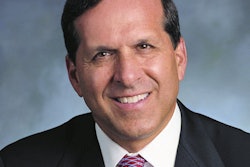
CHICAGO - Scheduling and case acceptance are two pillars upon which successful practices rely, according to a practice management presentation by Roger P. Levin, DDS, at the 2018 Chicago Dental Society Midwinter Meeting.
 Roger P. Levin, DDS, founder and CEO of the Levin Group.
Roger P. Levin, DDS, founder and CEO of the Levin Group.In his presentation, dental management expert Dr. Levin outlined how to build a schedule that works for both the dentist and the dental team. He also discussed the foundations of case acceptance and why dentists can't fake customer service.
"Scheduling and case acceptance are important because practices that implement these systems properly increase their production and profitability, but they also tremendously enhance their efficiency, which means a much smoother operational day," Dr. Levin told DrBicuspid.com in an interview.
Dr. Levin is the founder and CEO of dental management consulting firm the Levin Group. He is also a general dentist and a columnist for DrBicuspid.com.
Pillar 1: Scheduling
The majority of practice stress comes from schedule management, according to Dr. Levin. Therefore, a well-designed schedule is essential for the well-being of the dental team and dental practice.
“When you create a well-designed schedule, the result is a very enjoyable practice that's also performing well financially.”
"In any business, stress is based on inefficiency, and inefficiency lowers profitability," Dr. Levin said. "So when you create a well-designed schedule, the result is a very enjoyable practice that's also performing well financially."
The key is to build a schedule that doesn't fatigue or rush the dentist or the dental team. One way to do that is to schedule more complex procedures in the morning, moderate procedures in the middle of the day, and new patients and consults in the afternoon. This helps all members of the team finish on time, Dr. Levin explained.
"The overview would be to build a schedule that works for the doctor's and staff's fatigue and energy levels," Dr. Levin said. "We have had a lot of success building schedules this way."
It is also important to determine how much time the dentist needs for different types of patient services. This way, a practice can create a schedule that meets a production goal, while also allowing dental team members to work at a comfortable pace.
Pillar 2: Case acceptance
Case acceptance might be the most complex process in the dental practice, according to Dr. Levin. This is because so many scenarios and attributes affect case acceptance.
"It's not a complete science," Dr. Levin said. "There's a lot of art to it: interpersonal relations, patient motivation, understanding the patient, the diagnostic procedures. It's a complex system."
Although there may not be an exact science to case acceptance, providers can do two things to help increase their case acceptance rate, Dr. Levin said. The first is to build relationships with patients before presenting treatment, and the second aspect is include the patient in the decision-making process.
"The No. 1 factor is spending enough time to understand your patients and working with them to identify the right treatment choices and the right financial choices that will make it easier for them," Dr. Levin said.
One way to build rapport with patients is to make customer service part of the practice culture. Patients will be able to see through team members who are simply going through the motions, Dr. Levin said. Instead, he recommended going to work every day with true caring and compassion.
"You have to earn patient loyalty every single time you see them," Dr. Levin said. "Dentists want to have wonderful practices that treat patients well, but there is a modern skill set that needs to be learned to make that happen."



















